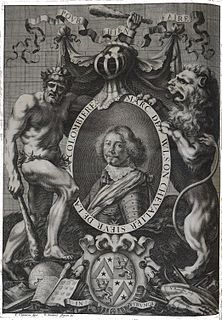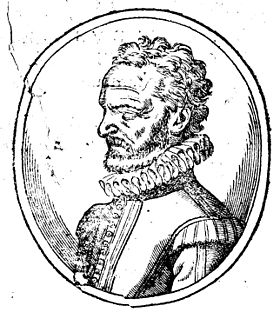Jean Sirmond (1589, Riom, France - 1649, Riom, France) was a neo-Latin poet and French man of letters, historiographer of Louis XIII.
Contents

Jean Sirmond (1589, Riom, France - 1649, Riom, France) was a neo-Latin poet and French man of letters, historiographer of Louis XIII.

Sirmond is known especially for his lifelong feud with Mathieu de Morgues, known as the lord of Saint-Germain, who favored Marie de Médicis and was against Cardinal Richelieu. Jean Sirmond answers it with a series of small works which he writes under various pseudonyms, such as Julius Pomponius Dolabella, the faithful French or Sieur of the Mountains.
He is nephew of P. Sirmond Jésuite, Confessor of King Louis XIII, & one of the wiser men of our century. He came to the Court, & by the favour of the Cardinal of Richelieu, which he estimated one of the best writers then, he was made Historiographer of the King... [1]
At the time of his stay in Paris, Sirmond collaborated in the drafting of the statutes of the l'Académie française, of which he became one of the first members in 1634. He also authored a Life of the Cardinal of Amboise, published in 1631, and wrote Latin poems, published posthumously in 1653. After the death of the king and the cardinal, he withdrew to his native Auvergne, finding himself without support after having fought so much.
Paul Pellisson paid Sirmond a personal homage, which also constitutes a testimony on the evolution of the French language, which some said was now sufficiently "reasonable" to be worthy to replace Latin and the Greek as the erudite and literary language of the day. Pellison writes:
J'ajoûterai ici par une espèce de reconnaissance, qu'un de ses ouvrages est une des premières choses, qui m'ont donné goût pour notre Langue. J'étois fraîchement sorti du Collège : on me présentoit je ne sais combien de Romans, & d'autres pièces nouvelles, dont tout jeune, & tout enfant que j'étois, je ne laissois pas de me mocquer, revenant toûjours à mon Cicéron, & à mon Térence, que je trouvois bien plus raisonnables. Enfin, il me tomba presque en même temps quatre livres [de Jean Sirmond] entre les mains [...]. Dès-lors, je commençai non-seulement à ne plus mépriser la Langue Françoise ; mais encore à l'aimer passionnément, à l'étudier avec quelque soin, & à croire, comme je fais encore aujourd'hui, qu'avec du génie, du temps, & du travail, on pouvoit la rendre capable de toutes choses. [2]

Savinien de Cyrano de Bergerac was a French novelist, playwright, epistolarian, and duelist.

Jean-François Marmontel was a French historian, writer and a member of the Encyclopédistes movement.
The Treaty of Huế or Protectorate Treaty was concluded on 6 June 1884 between France and Annam (Vietnam). It restated the main tenets of the punitive Harmand Treaty of 25 August 1883, but softened some of the harsher provisions of this treaty. The treaty, which formed the basis for the protectorates of Annam and Tonkin, and for French colonial rule in Vietnam during the next seven decades, was negotiated by Jules Patenôtre, France's minister to China, and is often known as the Patenôtre Treaty. The treaty was signed on the Vietnamese side by Phạm Thận Duật and Tôn Thất Phan, representatives of the emperor Tự Đức’s court.

Marc Vulson de la Colombière (†1658) or Sieur de la Colombière was a French heraldist, historian, poet, minion of the royal court. His name is sometimes spelt as Wulson and also as Volson.

Nicolas Chorier was a French lawyer, writer, and historian. He is known especially for his historical works on Dauphiné, as well as his erotic dialogue called The School of Women, or The Seven Flirtatious Encounters of Aloisia.

Robert Arnauld d’Andilly was a French conseiller d’État, specialising in financial questions, in the court of Marie de' Medici. By the elegance of his language, he was among the major poets, writers and translators of 17th century French classicism. A fervent Catholic, he played an important role in the history of Jansenism and was one of the Solitaires of Port-Royal-des-Champs. He was also renowned for his part in the development of the pruning of fruit trees, to which he was devoted.
Balthazar Baro (1596–1650) was a French poet, playwright and romance-writer.
Jean-Jacques Gautier was French theatre critic, novelist and essayist. A Norman via his father and a champenois via his mother, he was elected a member of the Académie française in 1972.

Antoine Jay was a French writer, journalist, historian and politician.
François de Cauvigny, sieur de Colomby was a French poet, translator, conseiller du roi and "orateur du roi pour les discours d'État".
François d'Arbaud de Porchères (1590-1640) was a French poet.
Amable de Bourzeis was a French churchman, writer, hellenist, and Academician.
Daniel Hay du Chastelet was a Frenchclergyman and mathematician. His brother Paul Hay du Chastelet was also a writer.
Charles-Claude Genest was a French clergyman, poet and playwright. He was born and died in Paris.
Matthieu Cottière (Cotterius) (1581–1656) was a French Reformed pastor at Tours and theological writer.

Bartholomew Laffemas was an economist, born in Beausemblant, France in 1545. He is officially recorded as dying in Paris in 1612. However, it is rumoured that he actually died on September 23, 1611, after falling from his horse. He is known as the first person to write about underconsumption
Jean-Gilbert Ymbert was a French playwright of the first half of the 19th century.

Étienne-Gabriel Peignot was a 19th-century French bibliographer.

Joseph Privat de Molières was a French physicist and mathematician, a member of the Académie des sciences and professor at the Collège royal.
Paul-Éric Blanrue, born 18 April 1967, in Metz, is a sceptical French writer and an antisemite.
| Wikiquote has quotations related to Jean Sirmond . |